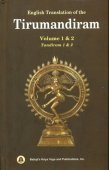Tiru, Tīru, Thiru: 5 definitions
Introduction:
Tiru means something in Hinduism, Sanskrit, the history of ancient India, Tamil. If you want to know the exact meaning, history, etymology or English translation of this term then check out the descriptions on this page. Add your comment or reference to a book if you want to contribute to this summary article.
Images (photo gallery)
India history and geography
Source: academia.edu: Minor Chiefs and "Hero" in Ancient TamilakamTiru or Tiruvu (“beautiful”, wealth, Lakṣmī, rainbow, radiance) is a name related to the historical geography and rulers of ancient Tamil Nadu, occuring in Sangam literature such as the Akanāṉūṟu and the Puṟanāṉūṟu.—(VIS 340-41), Śrī “Prosperity” (Bollée 2017: 85)

The history of India traces the identification of countries, villages, towns and other regions of India, as well as mythology, zoology, royal dynasties, rulers, tribes, local festivities and traditions and regional languages. Ancient India enjoyed religious freedom and encourages the path of Dharma, a concept common to Buddhism, Hinduism, and Jainism.
Languages of India and abroad
Sanskrit dictionary
Source: DDSA: The practical Sanskrit-English dictionaryTīru (तीरु).—Name of Śiva.
Derivable forms: tīruḥ (तीरुः).
[Sanskrit to German]
Sanskrit, also spelled संस्कृतम् (saṃskṛtam), is an ancient language of India commonly seen as the grandmother of the Indo-European language family (even English!). Closely allied with Prakrit and Pali, Sanskrit is more exhaustive in both grammar and terms and has the most extensive collection of literature in the world, greatly surpassing its sister-languages Greek and Latin.
Kannada-English dictionary
Source: Alar: Kannada-English corpusTiru (ತಿರು):—[noun] the string of a bow.
--- OR ---
Tiru (ತಿರು):—[adjective] holy; sacred; venerable.
--- OR ---
Tiṟu (ತಿಱು):—
1) [verb] to give to; to pass over into another’s hand; to hand over.
2) [verb] to pay (a sum of money).
--- OR ---
Tīru (ತೀರು):—
1) [verb] to come to an end; to be finished; to be done or accomplished.
2) [verb] to be used or consumed fully.
3) [verb] to be completely erased, without leaving any trace.
4) [verb] to decrease (oneself) in size, strength, influence, etc.
5) [verb] to cease to exist; to die.
6) [verb] to be cured or warded off.
7) [verb] to become possible (to be done, achieved, etc.).
8) [verb] to satisfy; to be satisfying.
9) [verb] (of time) to slip or pass by.
10) [verb] (a problem, quarrel, etc.) to be solved; to find a satisfactory solution.
11) [verb] to pay or settle a debt fully.
12) [verb] ತೀರಿಕೊಳ್ಳು [tirikollu] tīrikoḷḷu to become dead; to die; ತೀರಿಹೋಗು [tirihogu] tīri hōgu to be over; to be completed; to be finished; 2. to be exhausted; 3. to die; to pass away.
--- OR ---
Tīru (ತೀರು):—
1) [noun] any decision or judgement.
2) [noun] a terminating or being terminated; termination.
3) [noun] any way of doing, being; a kind, manner or mode.
4) [noun] the act of returning, repaying.
5) [noun] beauty; elegance.
--- OR ---
Tīru (ತೀರು):—[noun] = ತೀರಿ [tiri].
--- OR ---
Tīṟu (ತೀಱು):—[verb] to swallow in large amounts hastily or greedily; to gulp.
Kannada is a Dravidian language (as opposed to the Indo-European language family) mainly spoken in the southwestern region of India.
See also (Relevant definitions)
Starts with (+756): Thiruccerai, Thiruparankundram, Thiruthondathogai, Thiruvananthapuram, Thiruvidaimarudur, Tirduvar, Tiru nitru, Tiru-aiyarrucakkaram, Tiru-alatatti, Tiru-aliamutanar, Tiru-alikal, Tiru-allikeni, Tiru-anai-kaula, Tiru-anaiitu, Tiru-anaika, Tiru-anaikkapuranam, Tiru-anantarkattalai, Tiru-antikappu, Tiru-anukkan-riruvayil, Tiru-arur-mummanikovai.
Ends with (+22): Acavattiru, Amaraparttiru, Assinntiru, Atatiru, Atittattiru, Beltiru, Bittiru, Caiyottiru, Cappalittiru, Caturittiru, Cavittiru, Eluntiru, Ennankontiru, Hattiru, Kaluttiru, Kantiru, Katiru, Kattiru, Ketiru, Kotiru.
Full-text (+564): Tiru-purkutalai, Tiru-vilaiattu, Tiruttontar, Tirumanam, Tiruvanantalvan, Tiru-culakal, Peru-parra-puliyurnampi, Tiruppattam, Tirukkukai, Tiru-meykappan, Tiru-namakattiri, Tiru-nitripach-cha, Tiruvekampam, Tirumakal, Tiru-pulani, Tirumantiram, Tirukkarttikai, Tirunakar, Tiru-catankupustakam, Tiruvalaku.
Relevant text
Search found 20 books and stories containing Tiru, Thiru, Tīru, Tiṟu, Tīṟu; (plurals include: Tirus, Thirus, Tīrus, Tiṟus, Tīṟus). You can also click to the full overview containing English textual excerpts. Below are direct links for the most relevant articles:
Tiruvaymoli (Thiruvaimozhi): English translation (by S. Satyamurthi Ayyangar)
Pasuram 1.3.8 < [Section 3 - Third Tiruvaymoli (Pattu utai Atiyavar)]
Pasuram 6.8.10 < [Section 8 - Eighth Tiruvaymoli (Pon-ulaku aliro)]
Pasuram 2.5.2 < [Section 5 - Fifth Tiruvaymoli (Am Tamattu Anpu)]
Books and Authors < [July – September, 1982]
The Excellence of Love < [July-August 1933]
The Gods of the Tamils < [January, 1928]
Diaspora of Bhuta (Daiva) worshipping cult—India and Indonesia (by Shilpa V. Sonawane)
Part 1.4 - Tamil King who will Register the Vietnam King Sri Maran < [Chapter 4 - Inter-Disciplinary Analysis]
A History of Indian Philosophy Volume 3 (by Surendranath Dasgupta)
Part 1 - The Chronology of the Āḻvārs < [Chapter XVII - The Āḻvārs]
Part 5 - The Influence of the Āḻvārs on the followers of Rāmānuja < [Chapter XVIII - An Historical and Literary Survey of the Viśiṣṭādvaita School of Thought]
Part 2 - The Philosophy of the Āḻvārs < [Chapter XVII - The Āḻvārs]
The Religion and Philosophy of Tevaram (Thevaram) (by M. A. Dorai Rangaswamy)
Chapter 39 - Thiru Edirkolpadi or Tiru Etirkolpati (Hymn 7) < [Volume 3.4 - Pilgrim’s progress: with Paravai]
Nayanar 21: Appar (Tirunavukkarasar) < [Volume 4.1.1 - A comparative study of the Shaivite saints the Thiruthondathogai]
Nayanar 2: Tiru Neelakanta (Tirunilakanta) < [Volume 4.1.1 - A comparative study of the Shaivite saints the Thiruthondathogai]
Later Chola Temples (by S. R. Balasubrahmanyam)
Temples in Pattisvaram (Palayarai-Malapadi) < [Chapter X - Temples of Rajadhjraja II’s Time]
Temples in Tirusattimuttam (Rajarajapuram) < [Chapter X - Temples of Rajadhjraja II’s Time]
Appendix 2: Tiruvanakkoyil < [Chapter VIII - Temples of Rajaraja II’s Time]
Related products





